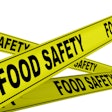Daily’s Premium Meats, LLC, a Salt Lake City establishment, is recalling approximately 170 pounds of ready-to-eat bacon products that may be adulterated with Listeria monocytogenes. The USDA’s Food Safety and Inspection Service (FSIS) made the announcement on Oct. 3.
The “Regular Ends Precooked Bacon” items were produced on Sept. 22.
The following products are subject to recall:
- 17 CASES of 2-5 lbs. PACKAGES IN CARDBOARD BOXES, CONTAINING “48108 REGULAR ENDS PRECOOKED BACON NET WT. 10 lbs. 2/5 lbs.” with a packaging date of “9/22/16” and use by date of “6/19/17.
The products subject to recall bear establishment number “EST. 6133” inside the USDA mark of inspection. These items were shipped to Associated Foods retail locations in Idaho and Utah.
The problem was discovered during the company’s routine internal third party testing when a product sample collected tested positive for Listeria monocytogenes (Lm). There have been no confirmed reports of illness or adverse reactions due to consumption of these products.
Consumption of food contaminated with Listeria monocytogenes can cause listeriosis, a serious infection that primarily affects older adults, persons with weakened immune systems, and pregnant women and their newborns. Less commonly, persons outside these risk groups are affected.
Listeriosis can cause fever, muscle aches, headache, stiff neck, confusion, loss of balance and convulsions sometimes preceded by diarrhea or other gastrointestinal symptoms. An invasive infection spreads beyond the gastrointestinal tract. In pregnant women, the infection can cause miscarriages, stillbirths, premature delivery or life-threatening infection of the newborn. In addition, serious and sometimes fatal infections in older adults and persons with weakened immune systems. Listeriosis is treated with antibiotics. Persons in the higher-risk categories who experience flu-like symptoms within two months after eating contaminated food should seek medical care and tell the health care provider about eating the contaminated food.
FSIS and the company are concerned that some product may be frozen and in consumers' freezers.
Consumers who have purchased these products are urged not to consume them and discard the products or return to the place of purchase.














